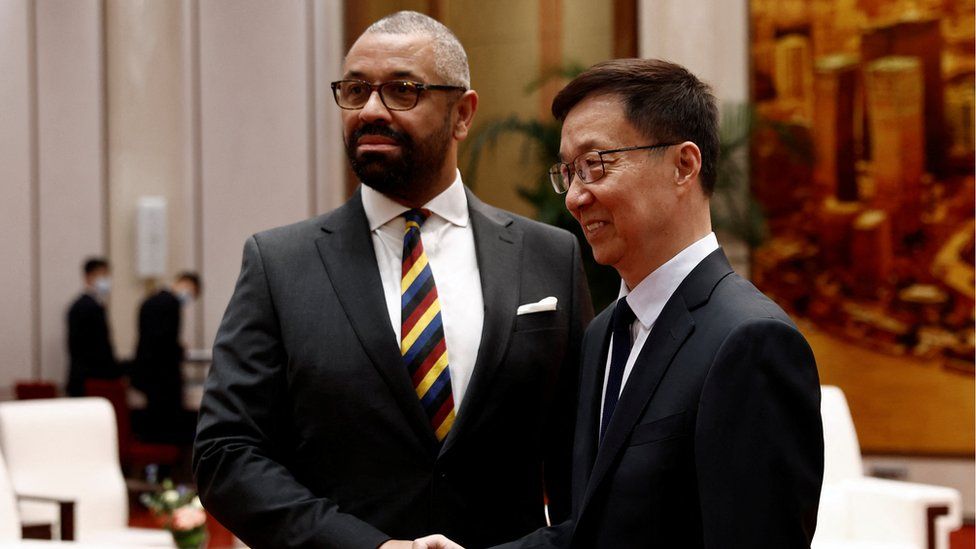3 minutes ago
About sharing
Foreign Secretary James Cleverly has defended holding talks with Chinese officials in Beijing, saying it would not be “credible” to disengage.
Meeting China’s vice president, Mr Cleverly said the trip, the first by such a senior UK figure in five years, would help avoid “mistrust and errors”.
But ahead of his visit, some UK MPs attacked the government’s approach to China as “incoherent”.
Senior Conservative MP Sir Iain Duncan Smith compared it to “appeasement”.
Relations between the UK and China have deteriorated in recent years following concerns over threats to civil liberties in the former British colony of Hong Kong, the threat of espionage and influence operations by China in the UK, and China’s support of Russia during the invasion of Ukraine.
Speaking to the BBC, Mr Cleverly said his visit was an opportunity to speak “directly and unambiguously” on areas of disagreement and “work together where it is in our mutual interest to do so”.
He said it would allow the UK to “re-establish lines of communication” and added that a lack of face-to-face engagement could lead to “more opportunities for perhaps misinterpretations, mistrust and errors”.
“I’m realistic that one phone call, one visit, one meeting isn’t going to fundamentally change the direction of travel,” he said, but added that “patient, consistent and reliable communication could have an effect”.
“That is why I bring up issues around human rights, Xinjiang, Hong Kong and indeed individual cases every time I have meetings with representatives of the Chinese government.”
Asked about China’s support for Russia in Ukraine, Mr Cleverly said the country had an interest in bringing the war to “a fair and successful conclusion”.
“I don’t think it is in China’s interest for there to be a perception they are supporting actively or even passively Putin’s actions.
“I think Beijing do care what the world thinks of them. They recognise their future is interwoven with the prospects of other countries around the world.”
‘Elusive’
On Wednesday, Mr Cleverly met China’s Vice President Han Zheng at the Great Hall of the People in Beijing. He is also expected to hold talks with China’s foreign affairs minister Wang Yi.
The UK-China relationship has changed dramatically since 2015, when David Cameron’s government hailed a “golden era”.
At the time, then-Chancellor George Osborne said the UK had “cemented its position as China’s best partner in West” and Mr Cameron took Chinese President Xi Jinping for a pint in his local pub.
However, since then tensions over a number of issues have seen relations fall to a new low.
The UK government has criticised China for its treatment of Uyghur Muslims living in the country and in 2021 it banned the Chinese company Huawei from UK’s 5G infrastructure citing security concerns.
The same year, China banned five MPs – including former Conservative leader Sir Iain Duncan Smith – accusing them of spreading “lies and disinformation”.
As prime minister, Liz Truss was reportedly planning to re-categorise China as a “threat” to the UK.
Rishi Sunak has resisted calls to go that far but in 2022 he said that the “golden era” of relations with China was over and said attempts to build closer ties had been “naïve”.
Mr Cleverly’s visit comes as the Commons Foreign Affairs Committee criticised the government’s approach to China in a new report on UK policy in the Indo-Pacific.
The report describes the activities of the Chinese Communist Party as “a threat to the UK and its interests”.
It raises concerns about a lack of coherence in the government’s approach and calls for an unclassified version of its China strategy to be published to provide guidance to the public and private sectors.
The committee also argues that all relevant ministers should be briefed on the higher classification version of the strategy.
The committee’s Conservative chairwoman, Alicia Kearns, said: “The confidential, elusive China strategy is buried deep in Whitehall, kept hidden even from senior ministers across government.
“How can those implementing policy – and making laws – do so without an understanding of the overall strategy?”
Asked on Tuesday if Mr Cleverly should be visiting Beijing, she told the BBC: “It is more important that we are in the room with them in stark disagreement, rather than cutting off relations.”
‘Weak’
However, former Conservative party leader and minister Sir Iain said the visit was the latest stage of “Project Kowtow”.
He told the PA news agency the UK position “smells terribly of appeasement”.
“It’s like we want more business, therefore we don’t want to upset the Chinese too much,” he said.
“What we end up with is that they think we are just too weak.”
Labour’s shadow foreign secretary David Lammy accused the Conservative government of more than a decade of “division, inconsistency and complacency towards China”.
He said the government needed to secure “tangible diplomatic wins” including an end to Chinese sanctions on British parliamentarians.
